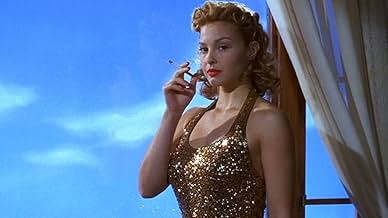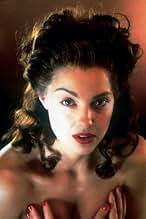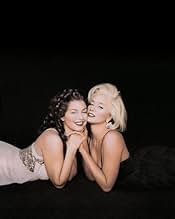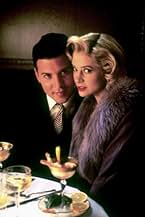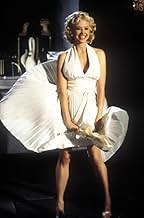This film follows Norma Jean from her simple, ambitious youth to her superstar pinnacle and back down. She moves from lover to lover in order to further her career. She finds fame but never ... Read allThis film follows Norma Jean from her simple, ambitious youth to her superstar pinnacle and back down. She moves from lover to lover in order to further her career. She finds fame but never happiness, only knowing seduction but not love.This film follows Norma Jean from her simple, ambitious youth to her superstar pinnacle and back down. She moves from lover to lover in order to further her career. She finds fame but never happiness, only knowing seduction but not love.
- Nominated for 5 Primetime Emmys
- 7 nominations total
- Director
- Writers
- All cast & crew
- Production, box office & more at IMDbPro
Featured reviews
But, really, that's beside the point. Whether or not Marilyn was truly like Sorvino plays her isn't really an issue. The surreal qualities of Norma Jean & Marilyn give ample indication that the filmmakers had no intention to go out and make a straightforward biopic. What they have in mind here is more complex. As heavy-handed as it may be, the symbolism is the real focus of the movie. Marilyn Monroe had two identities, and Sorvino and Ashley Judd go to great pains to illustrate in no uncertain terms that these two identities were in conflict with one another. The very different characterizations aren't saying that Marilyn was two different people. They are simply a case of filmmakers taking dramatic license to exaggerate something for the sake of making it clearer: Norma Jean Dougherty reinvented herself in her mind as someone who could get what she couldn't get herself. Try not to think of this film as a study of Monroe's outward change from Norma Jean to Marilyn. Think of it as more of a look inside her head, as an analysis of all the motives and frustrations bouncing around in her mind, and ultimately serving to identify her more than any physical appearances could ever do. It doesn't matter whether or not she really saw the word "Bourbon" and read it as "Bonbon." As the film lays it out, this is her image of herself, and in reflex, everyone else's image of her.
And then there are those who will complain that it isn't right to speculate on someone's image of herself. But you can't ask a film to stick completely to facts. Conjecture is what makes nonfiction interesting. And it is what makes Norma Jean & Marilyn interesting.
On the acting and in response to those who see the film as "soapy" and "campy": Life is a soap opera. Most of us are able to keep that at bay and live life as a perfectly reasonable chain of events. But desperate people historically are not able to do that. Drama is what they have, and drama is how they can get results. Marilyn, as the film puts it (and remember, you need to always look at a film like this on its own merits, especially when it doesn't portray itself as factual, which this one emphatically does not) is one of these desperate people, and the script respects that as a mean to that untimely end. Mira Sorvino's performance understands this. Yes, it's pretty wooden at first, but by the time she sings Happy Birthday to President Kennedy, hopped up on her crutch of barbituates and alcohol, her Marilyn has become fully realized in the downward spiral that will eventually take her life. Coupled with Ashley Judd's commanding performance as the girl who can only get what she wants by becoming someone else, and Sorvino's performance makes a full, tragic character, keeping to that perception of Marilyn Monroe as the eternal blonde bombshell legend.
This is a movie with a gimmick in that there are two Marilyn Monroes. Ashley Judd plays the icon in her younger days as unknown Norma Jean. Mira Sorvino takes over when Hollywood transforms Norma Jean into Marilyn Monroe. But we have not heard the last of Norma Jean as Judd continues to pop up now and again as an inner voice so to speak, sometimes to encourage and sometimes to berate and ridicule Sorvino's Marilyn. The point being that young Norma Jean desperately wanted to be a star and refuses to allow Marilyn to screw things up. Suffice to say these constant appearances by her younger self do not help Marilyn's state of mind as her life begins to spiral out of control towards her inevitable sad end. The two lead actresses perform their roles well. Judd is pitch-perfect as the desperate, driven Norma Jean. Sorvino is pretty much stuck doing a Marilyn Monroe impersonation but she makes the best of what she has to work with. As presented here the character may come off as a bit too much of a dumb blonde bimbo to really ring true. Surely, for all the myriad issues she had, the real Monroe was brighter than she's given credit for here. But it's hard to blame Sorvino, she can only portray the character as it was written. All in all it's a fairly gripping, if not entirely truthful, drama. And having two actresses play the famed icon at different points in her life adds a unique twist. This is clearly no work of genius but if you're looking for a reasonably entertaining movie you could do a lot worse.
The movie is not entirely successful, because Sorvino plays Marilyn as her flighty image of the films rather than a logical continuation of the Norma Jean persona, making her death occur with a whimper rather than a grand crash. But it is very definitely worthwhile for seeing Ashley Judd play Norma Jean to the hilt as a woman whose delicate features overlay a soul of chromium steel, determined never to repeat the humiliations of her girlhood. It was an entirely different angle on Norma Jean/Marilyn to see her arrive late (!) for an audition and blithely push her way past other starlets to catch the attention of the producer; or watch her, in a fantasy sequence, run over her former hapless self in a car. I was sorry when 'Norma Jean's half' of the movie was over, and pleased to see her return briefly at the end.
Did you know
- TriviaMira Sorvino has stated that the best compliment she ever got came from Marilyn Monroe's ex-husband, Arthur Miller. At the time, Miller was working with Winona Ryder on La Chasse aux sorcières (1996). After seeing this movie, he told Ryder he'd been very impressed by how well Sorvino understood Marilyn's pain. Ryder happily relayed the compliment to Sorvino.
- GoofsThe film has almost too many factual errors to be mentioned and shouldn't be considered a "true" portrait of Monroe's life.
- Quotes
Marilyn Monroe: Oh, that's what I love about you, Monty. You're the only one I know that's more fucked up than me.
- ConnectionsFeatured in The 48th Annual Primetime Emmy Awards (1996)
Details
- Release date
- Countries of origin
- Language
- Also known as
- Norma Jean and Marilyn
- Filming locations
- Production company
- See more company credits at IMDbPro
Box office
- Budget
- $7,500,000 (estimated)
- Runtime2 hours 19 minutes
- Color
- Sound mix
- Aspect ratio
- 1.33 : 1
Contribute to this page


